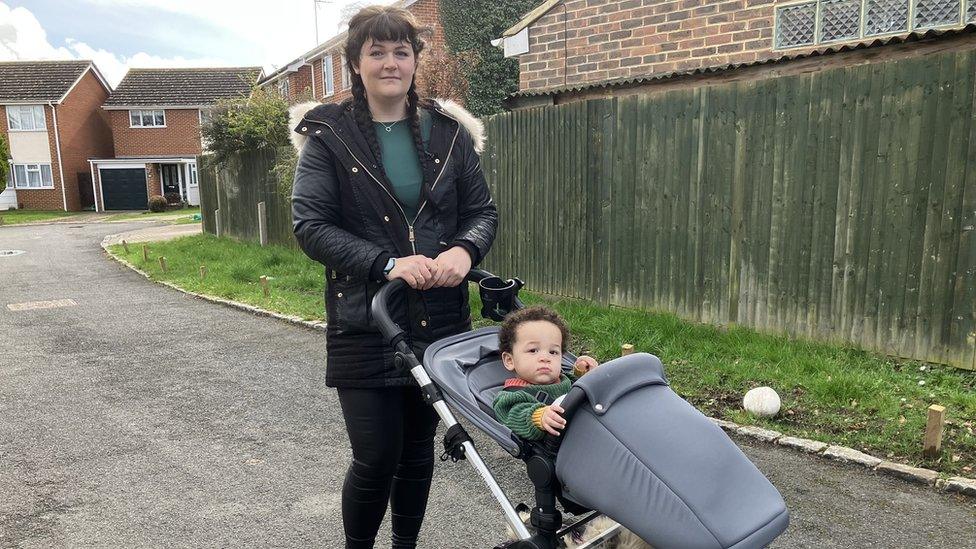Renting: Shortfall of properties creates frenzied market, surveyors say
- Published

Fierce competition among tenants chasing a limited number of homes to rent shows no sign of abating, surveyors say.
One agent said the rental market in his area was "frenzied" as tenants tried to secure the few available properties.
The Royal Institution of Chartered Surveyors (Rics) said a similar picture was being seen across the UK.
It is likely to push up rents further, averaging at a 4% annual increase, adding to pressure from rising prices.
'No end in sight'
The monthly Rics survey showed that the proportion of its members reporting growth in demand among tenants was at a five-month high in March.
At the same time, the rental sector was "constrained" by a lack of homes available to let.
This meant rents were getting more expensive.
Rather than pockets of competition in certain parts of the country, Simon Rubinsohn, chief economist at Rics, said the problem was striking in its consistency across the UK.
Andrew Oulsnam, a surveyor in Birmingham, said that demand for properties far exceeded supply, with many landlords deciding to sell whenever a tenant left.
"There is no end in sight for a serious shortage of properties to rent," he said.
Surveyors reported that tax and regulations were leading many landlords to consider whether to continue or sell up.
Your device may not support this visualisation.
Although the imbalance between demand and supply - particularly for family homes - was pushing up the cost of renting, there were also warnings that tenants already faced financial strain from rising bills and prices.
"Tenants' budgets are coming under pressure due to the rise in the cost of living. Landlords who choose to price sensibly are attracting the most interest," said Alec Harragin, from Savills estate agents in London.

Emily is hoping for somewhere to rent as a family
Emily, her partner, and their baby son MJ had been renting a two-bedroom flat in Aylesbury. The landlord wanted to put up the rent at the end of their current tenancy but the family could not afford it. They began searching for somewhere else to live, but it has been frustrating.
"There's been times when I've said, 'Yes, I'll take this one'," Emily told the BBC last month. "I love it, it's perfect, and then they'll say, 'It's gone'." It has been, she said, "the most stressful time of my life - other than having a baby".
After months of searching, the family had to move out of their home and move back in with their families - which meant Emily and her partner staying under different roofs.
"On our actual relationship it's been really difficult," she said.
They hope now to have finally found somewhere to live together, but it was relatively costly, she said.
The sales market was reported to be much calmer, with a lack of activity proving to be the key issue, according to Rics.
The survey suggested that surveyors were most likely to report falling levels of interest from buyers, fewer homes being put up for sale, and house prices falling. Although potential first-time buyers would welcome dropping house prices, many face having to pay higher rents which affects their ability to save for a deposit. Mortgage costs will also be much higher than many might originally have budgeted for.
The expectation was for lower levels of sales to continue in the coming months.
"Deals are being done, but a theme coming through in the anecdotal remarks is the need for vendors to recognise the shift in market dynamics," said Mr Rubinsohn.
Over the medium term, the picture was more settled with an expectation that interest rates may have peaked.
A slight rise in activity and house prices was predicted by surveyors in a year's time.
Separately, the government has launched a consultation in England that would mean that homeowners would need to get planning permission before converting properties into short-term holiday lets in tourist hotspots.

What are your renting rights?
How much can my landlord increase the rent? It depends on your agreement but rises must be fair, realistic and in line with local properties and there's usually a months notice.
Can my landlord evict me? Landlords need to follow strict rules such as giving written notice. Once the notice period ends, the landlord can start eviction proceedings through court.
Can a landlord refuse people on benefits? No. DSS policies are unlawful discrimination. says charity Shelter., external Some councils have lists of private landlords who rent to tenants claiming benefits.
There's more on your renting rights and where to go for help here.


Are you struggling to find a home to rent? Please share your experiences by emailing haveyoursay@bbc.co.uk, external.
Please include a contact number if you are willing to speak to a BBC journalist. You can also get in touch in the following ways:
WhatsApp: +44 7756 165803
Tweet: @BBC_HaveYourSay, external
Please read our terms & conditions and privacy policy
If you are reading this page and can't see the form you will need to visit the mobile version of the BBC website to submit your question or comment or you can email us at HaveYourSay@bbc.co.uk, external. Please include your name, age and location with any submission.
- Published29 March 2023

- Published6 April 2023

- Published29 March 2023
